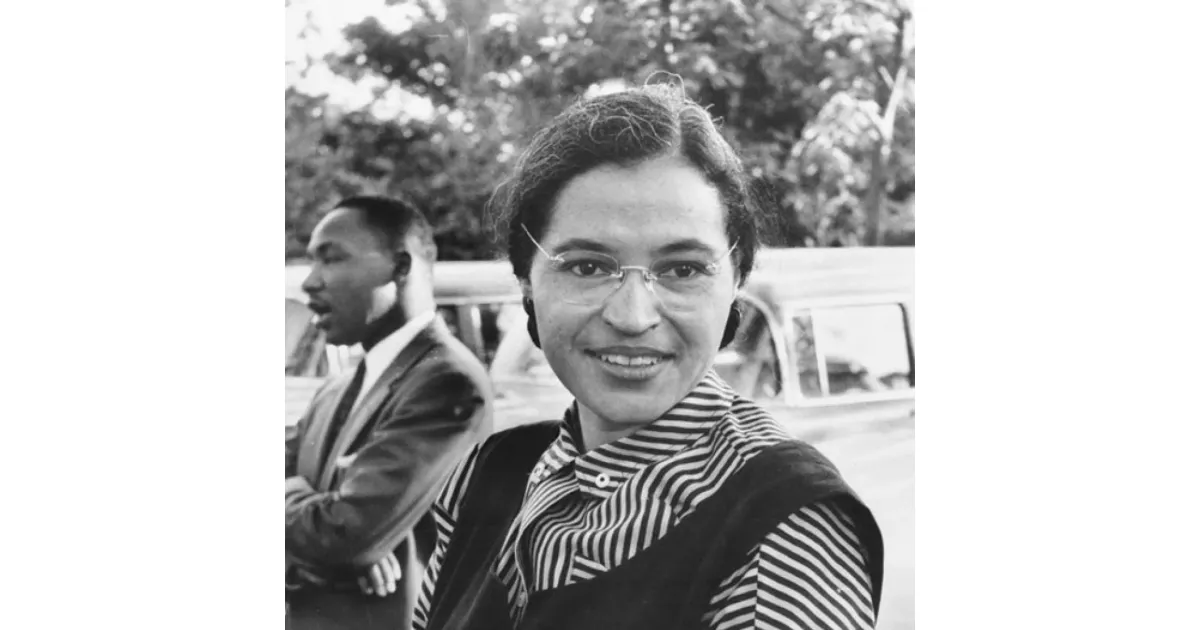A success timeline featuring the most significant achievements of Rosa Parks.
Rosa Parks, an American civil rights activist, is renowned for her courageous act in 1955 when she refused to give up her bus seat to a white passenger in Montgomery, Alabama. This act of defiance against the Jim Crow segregation laws ignited the Montgomery bus boycott, a pivotal event in the Civil Rights Movement. Often called the 'mother of the civil rights movement,' Parks's bravery and commitment to equality helped catalyze widespread efforts to end racial segregation and discrimination in the United States, making her a significant figure in American history.
1933: Completed High School Education
In 1933, Rosa Parks completed her high school education with encouragement from Raymond. At the time in Alabama, only 7% of Black people held a high school diploma.
1945: Parks successfully registered to vote
In 1945, Rosa Parks successfully registered to vote after multiple attempts, despite various obstacles preventing Black people from registering.
1955: Refusal to move on bus sparks boycott
In 1955, Rosa Parks refused to give up her seat to a white passenger on a bus in Montgomery, Alabama, violating Jim Crow laws. This act of defiance led to her arrest and sparked the Montgomery bus boycott, a pivotal event in the civil rights movement.
1955: Arrest and Bus Boycott
In 1955, Rosa Parks was arrested for refusing to give up her seat on a bus, leading to a widespread boycott organized by the Women's Political Council (WPC) and the Montgomery Improvement Association (MIA). The boycott, which lasted 381 days, ended after segregation on buses was deemed unconstitutional in the court case Browder v. Gayle.
December 20, 1956: Supreme Court Orders Integration of Montgomery Buses
On December 20, 1956, the Supreme Court ordered the integration of Montgomery's buses after rejecting appeals by the city of Montgomery and the state of Alabama. This ruling led King to call off the boycott that day, 381 days after it began.
1963: SCLC Established Rosa Parks Freedom Award
In 1963, the Southern Christian Leadership Conference (SCLC) established the Rosa Parks Freedom Award.
1965: Received "Dignity Overdue" Award
In 1965, Rosa Parks received the "Dignity Overdue" award from the Afro-American Broadcasting Company and was honored at a ceremony held at the Ford Auditorium in Detroit.
1968: Received Martin Luther King Jr. Award
In 1968, Rosa Parks was presented with the Martin Luther King Jr. Award by the Capitol Press Club.
1972: Received Rosa Parks Freedom Award
In 1972, Rosa Parks received the Rosa Parks Freedom Award from the Southern Christian Leadership Conference (SCLC).
1979: Awarded Spingarn Medal by the NAACP
In 1979, the NAACP awarded Rosa Parks the Spingarn Medal, recognizing her "quiet courage and determination" in refusing to relinquish her seat.
1980: Received Martin Luther King Jr. Award from the NAACP
In 1980, Rosa Parks received the Martin Luther King Jr. Award from the NAACP.
1983: Inducted into Michigan Women's Hall of Fame
In 1983, Rosa Parks was inducted into the Michigan Women's Hall of Fame.
1984: Received Candace Award
In 1984, Rosa Parks received the Candace Award from the National Coalition of 100 Black Women.
1992: Received Peace Abbey Courage of Conscience Award
In 1992, Rosa Parks received the Peace Abbey Courage of Conscience Award.
1993: Inducted into National Women's Hall of Fame
In 1993, Rosa Parks was inducted into the National Women's Hall of Fame.
1996: Received Presidential Medal of Freedom
In 1996, Rosa Parks received the Presidential Medal of Freedom from President Bill Clinton, which is the highest award a civilian can receive from the United States executive branch.
1999: Awarded Congressional Gold Medal and Windsor–Detroit International Freedom Festival Freedom Award
In 1999, Rosa Parks was awarded the Congressional Gold Medal and was honored with the Windsor–Detroit International Freedom Festival Freedom Award. Time also named her one of the 20 most influential figures of the 20th century.
2000: Received Alabama Governor's Medal of Honor and Alabama Academy Award
In 2000, Rosa Parks received the Alabama Governor's Medal of Honor and the Alabama Academy Award.
2003: Received International Institute Heritage Hall of Fame Award
In 2003, Rosa Parks received the International Institute Heritage Hall of Fame Award.
2005: Posthumous honors and memorial services
After Rosa Parks's death in 2005, she was honored with public viewings and memorial services in Montgomery, Washington, D.C., and Detroit. She received numerous awards and honors, including the Presidential Medal of Freedom and a Congressional Gold Medal, and was the first Black American to be memorialized in the National Statuary Hall.
Mentioned in this timeline

Nicki Minaj born Onika Tanya Maraj-Petty is a highly influential...

Martin Luther King Jr was a pivotal leader in the...
Barbie is a fashion doll created by Ruth Handler and...
Germany officially the Federal Republic of Germany is a nation...

Inflation in economics signifies an increase in the average price...
Virginia a state in the Southeastern and Mid-Atlantic US lies...
Trending

26 minutes ago Clara Tauson Dominates Linette in Dubai, Secures WTA 1000 Quarterfinal Spot

27 minutes ago Pegula Defeats Jovic, Advances to Dubai Quarterfinals; Set to Face Tauson
27 minutes ago Toyota Supra and Lexus LC May Share Platform for Next Generation Models
27 minutes ago Alaska Airlines pilots get shocking pay raises, reshaping network and margins.
28 minutes ago Ramadan 2026 Timetable: Fasting Hours, Suhoor, and Iftar Times Worldwide Confirmed.
1 hour ago Ski Mountaineering to Debut at Milan-Cortina Winter Olympics in 2026.
Popular

Jesse Jackson is an American civil rights activist politician and...
Randall Adam Fine is an American politician a Republican who...

Pam Bondi is an American attorney lobbyist and politician currently...

Barack Obama the th U S President - was the...

Martin Luther King Jr was a pivotal leader in the...

Ken Paxton is an American politician and lawyer serving as...
